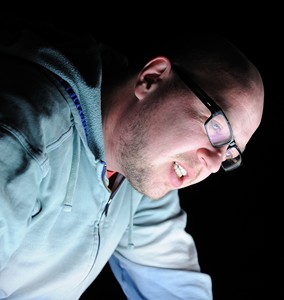about the production
Variations of Count Bernard de Montrogaux‘s story have been known in the world literature for several hundred years now. Perhaps the most famous are the fairytale version written by Charles Perrault and the opera by Béla Bartók Bluebeard‘Castle. To search for the essence and the meaning of the origin of the legend itself could only lead us into a blind alley, because the version by the contemporary German playwright Dea Loher takes just one simple fact out of it: “Once upon a time there lived a shy man who caused, under obscure circumstances, the death of seven women.”
The production of the Bluebeard (Hope of Women) in the City Theatre in Žilina has ranked among the particularly interesting dramaturgical actions which appeared in this institution in several past seasons. A targeted programme structure, distinctly directed at the texts of contemporary world and Slovak drama is rather unusual in such a concentrated measure and it clearly deserves attention.
The fragile and dreamy version of Bluebeard by one of the most recognised German contemporary playwrights, whose language in the play is functioning mainly at the level of pure metaphors, really stands out from the versions of the famous legend mentioned above. Bluebeard is no longer a prince but rather an ordinary salesman of shoes, he does not own a castle but simply walks along the street and somewhere there he meets the love of his life. The time of her play is concentrated, the feelings of the characters are only a sort of a strange ecstatic extract. This is why this love lasts only a few moments, although it reflects the eternity of a fulfilled dream. This woman commits suicide, because such is the essence of love that has been fulfilled – it cannot last. And every other woman he meets must become a victim of emptiness. Not because he is no longer able to love but because the existential feeling of other women for him does not interest him at all. The feeling is only a painful Calvary for them, a meaningless burden and he liberates them – by killing them and thus saving them from the inability to have that feeling fulfilled. There is only one who can, eventually, help him. Paradoxically, the one who doesn’t see him, because... she cannot see.
The minimalistic director’s style by Eduard Kudláč is, in this case, filled by the actors‘ precision and sensitivity, which goes very well with the text. A gentle, almost meditative ambience resists any form of expressive convulsion; therefore, every emotional motion is visible, almost tangible. This subtlety and proximity are a safe starting point away from psychopathology that could have harmed the interpretation, if it had been an explanation for any motivation by any of the characters. What is strange is that particularly the female portraits are, in their extracted form, more realistic than Bluebeard himself who has been balancing on the edge all the time. He is weaker than the women and his strength is materialised only through his ability to kill them. Neither his eyes nor his breath are hysterical, therefore he disturbs us. It is not a disturbance caused by a pathological deviation of a murderer, but a disturbance caused by a man empty of the ability to fulfil his emotion and, therefore, condemned to be a criminal, who is himself killed right at the end.
The production itself oscillates on the border of a strange dream and only the proximity and openness can help us to go through it. I didn’t have the feeling that someone was misleading me, only leading me. Towards a place from which it is difficult to return. Towards silence. Towards emptiness. Towards seclusion which means escape. At least for a while.
Peter Pavlac
creators
directed by Eduard Kudláč
text: Dea Loher
Slovak translation: Peter Lomnický
English translation author: Daniel Brunet, supported in part by an award from the National Endowment for the Arts
dramaturgy: Zuzana Palenčíková
set an costume design: Eva Kudláčová – Rácová
music selection: Eduard Kudláč
characters and cast: Henrich The Bluebeard: Michal Režný, Júlia: Juliána Oľhová a. h., Anna: Ivana Kubáčková, Judita: Kristína Sihelská, Tanja: Erika Havasiová, Eva: Barbora Švidraňová, Christiana: Anna Čonková, The Blimd: Iveta Pagáčová
director

Eduard Kudláč (1972) – dramaturgist and director, studied theatre direction at the Academy of Performing Arts in Bratislava (VŠMU) and at the Summer Academy for Performing Arts in Sofia. His focus on the search for new possibilities in the theatre through motion, fragmentation, non-verbal expression and action was fully developed in his own theatre group phenomenontheatre, which he founded in 2000 as an independent platform for the present day theatre. Since 2009 Eduard Kudláč has been active as the artistic director of the Municipal Theatre in Žilina, which he has been shaping as a theatre with a daring dramaturgy focusing on contemporary Slovak and foreign texts or unconventional interpretations of classical works. He directed several award winning productions in Žilina (H. Müller: Description of a Picture, 1999), (S. Belbel: Mobile Phone, 2008), (R. Schimmelpfennig: Woman from the Past, 2009), (P. Handke: Underground Blues, 2010) and in the Slovak Chamber Theatre in Martin (R. Schimmelpfennig: Before/Then). His productions were introduced at many international festivals. The Woman from the Past was introduced at the International Festival Divadelná Nitra 2009.
Materials available
Video of the production: no
Script of the production: SK, EN
If you are interested in these materials, write to archivy@nitrafest.sk
